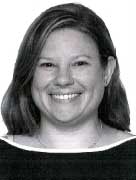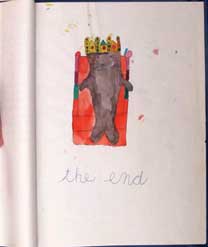Colorful Notes and an Eye for Detail
How Christina Crumpecker Bridges Writing and Medicine
By Dan Meyers
 Maybe it all began with Whiskers, the Seal of Iceland. Not familiar with Christina
Maybe it all began with Whiskers, the Seal of Iceland. Not familiar with Christina
That was third grade. Today, she’s the one taking copious notes during rounds as a fourth-year medical student at CU. She’s writing down medical data … and literary ideas. She won second place in a national poetry contest for medical students. She also won CU’s Melissa Adams Memorial Award in Medicine and the Humanities for her essay, "Little Things." It’s about a patient who, without explanation, gives her a piece of glass smoothed by the sea. Here’s a sample:
"You don’t know it,
She’s good.
"She is the warmest most empathetic person I ever met," says her friend and fellow med student Chris Galton. "Her smile makes me forgot most of the ills of the world."
Her first literary work, in kindergarten, was titled "I Lick My Dog."
She was introverted as a girl, living in a world of imagination.
"The books I loved were The Chronicles of Narnia and The Secret Garden," she remembers. "You know, if I just look around long enough I will find the entrance to the secret world I’m supposed to be in."
In third grade, the girl from the Midwest became fixated on aquatic mammals. Her mother taped lined paper behind plain paper so Christina could write her story about Whiskers the seal in neat, straight rows. The teacher put a cover on it and tucked a library card into the inside jacket.
 "It was the most thrilling thing. That was a real book if you could check it out of
"It was the most thrilling thing. That was a real book if you could check it out of
Although Crumpecker kept writing, she was drawn to the healthcare side of her life. Maybe that was the magic world she was supposed to be in. She moved to Denver to become a paramedic. She loved the hands-on stuff, "being able to fix things." There was an odd intimacy to the job.
"You have two people who are total strangers, yet you’re instantly in one of the most intense experiences you could have. There’s nothing quite like it."
Galton says that in medical school, and before, Crumpecker was a big note taker: "Meticulous. And she’s like a kid with a big box of crayons. She uses all kinds of different colors."
Yes,
Medicine, she found, helps writing. Sometimes it’s life or death stuff, grist for a story. And you get a new vocabulary, phrases such as "insensible losses"—water lost from breathing or through the skin—a medical term, a metaphor and, eventually, the title of the poem she read to an audience in Ohio after it placed second in the national William Carlos Williams poetry contest.
But even more, writing helps medicine.
"Especially in family medicine, it is a narrative, a story,"
It’s in the details,